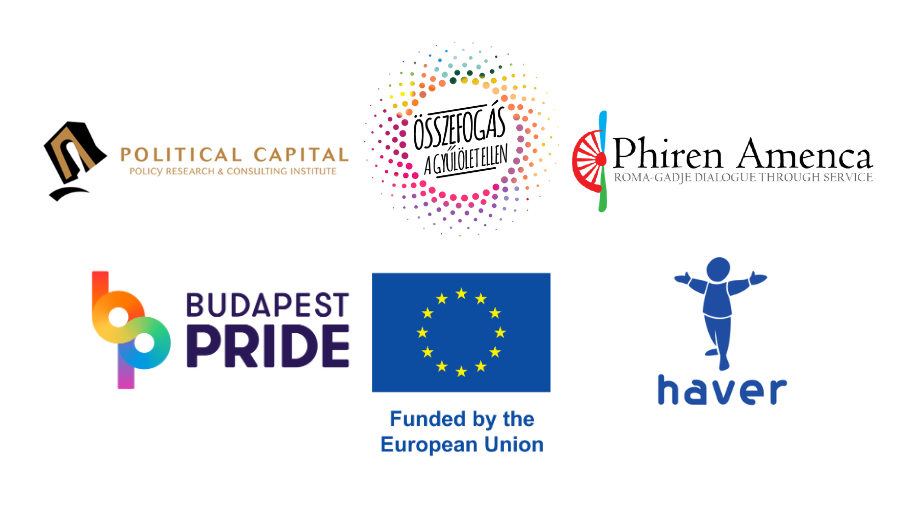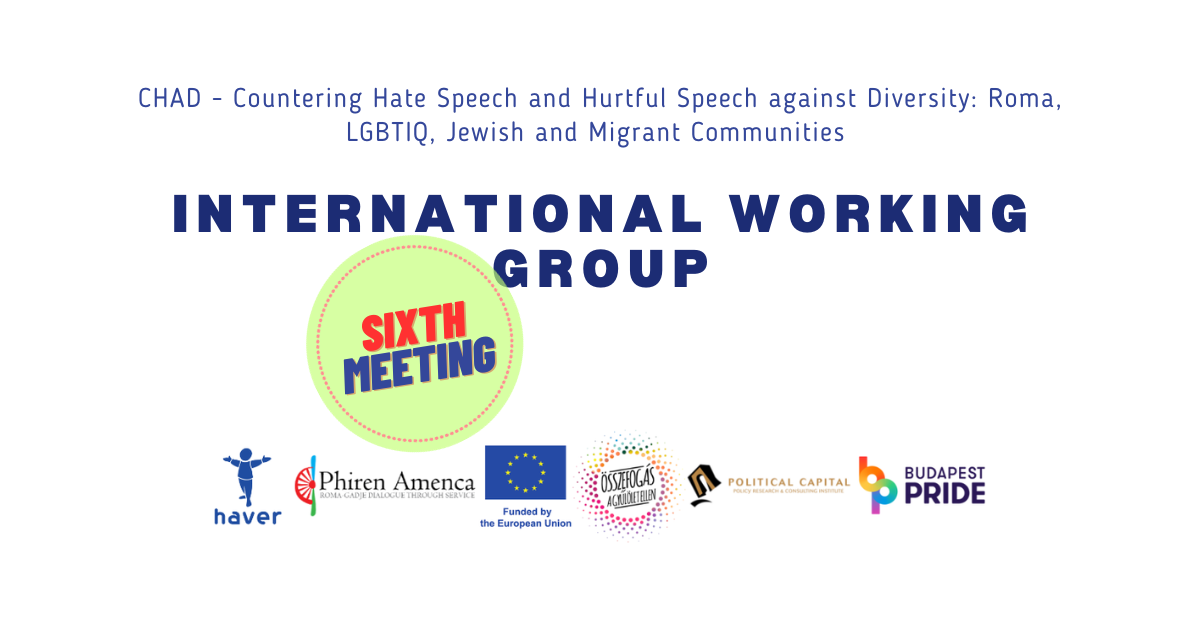September 5, 2023 – Online
The international working group, formed in the frame of the CHAD project, had its sixth meeting on 5 September 2023. The topic was the media representation of vulnerable groups, and the meeting focused on how different CSOs can cooperate with media actors (e.g. media products, PR/marketing agencies, influencers etc.) to create prejudice- and stereotype-free minority representations and form public discourse accordingly.
Four presentations took place at the meeting. The first was by Denitsa Ivanova, showcasing “Project Dream,” a project aimed at overcoming discrimination against young Roma people. The second presentation was given by Peter Weisenbacher and Lydia Kokavcova, where they discussed their efforts to counter online Roma cyberhate through their TikTok campaign. The third presenter, Banguolė Žalnieriūnatė, provided an overview of their media monitoring campaign to assist marginalised groups. The fourth presenter from Bulgaria, Bistra Ivanova, introduced the working group to Multi Kulti Collective’s most recent creative media campaigns.
Introduction of the presenters:
- Denitsa Ivanova is the Coordinator of Youth activities and media relations at Amalipe Center for Interethnic Dialogue and Tolerance in Bulgaria.
- Peter Weisenbacher is a human rights advocate, publicist and the executive director of the Human Rights Institute in Slovakia. Lydia Kokavcova is a freelance journalist and works for the Human Rights Institute.
- Banguolė Žalnieriūnatė is a media monitoring specialist at Media4Change organisation in Lithuania.
- Bistra Ivanova is chairperson and integration expert at the Bulgarian not-for-profit organisation Multi Kulti Collective.
Summary of the presentations
Project Dream – A participatory approach in the education environment to overcome discrimination of young Roma on new media
Amalipe, a Bulgarian NGO working for Roma integration into Bulgarian society, collaborated as a partner in Project Dream (2019-2022). This project focused on analysing stereotypes against the Roma community and creating a toolkit to combat discrimination. The project was funded by the Erasmus+ programme, with four countries participating: Spain, Bulgaria, Romania, and Italy. A comparative report on the discrimination of the Roma community on the new media was conducted in each of the countries mentioned above, and with the help of local NGOs and schools, a toolkit on participation in education to overcome discrimination against young Roma was designed, improved, and tested.
Comparative Report:The team conducted a background study to better understand discrimination against Roma individuals in both online and offline experiences. The project partners developed a questionnaire on hate speech, which received over 1500 responses. The results revealed several interesting details regarding the issue, with similar results across all four of the countries studied. The report suggests that most Roma people still face discrimination, with the situation of Roma women being particularly concerning. While the majority of people are aware of the extent of the issue, the media continues to depict Roma people as a public threat who steal resources from “the people.” The study also pinpointed that current institutions offer insufficient protection to minority groups, which highlights the need to develop a new and effective toolkit to combat online discrimination.
Finetuning the toolkit and pilot test:To create a toolkit aimed at alleviating discriminatory issues in schools, parents, teachers, operators, and pupils worked closely together in all four countries. Amalipe conducted its pilot program in a Bulgarian school, where they ran workshops with students and programs with mothers. These workshops helped students address online threats through interactive games and discussions. A crucial aspect of the program involved parents, who, through interactive games, learned how to protect their children from online threats, gain a better understanding of their identity, and learn what to share online and what not to. The pilot program validated the toolkit, profoundly impacting both parents and students.
Human Rights Institute Slovakia: Covering topics of Roma and related issues in the media
The Human Rights Institute in Slovakia recently presented two impactful projects aimed at addressing critical issues concerning minorities in Slovakia, with a special focus on the Roma community. The Roma community faces dire living conditions in Slovakia; many don’t have access to water and electricity. Improving their living conditions would provide the best chance for them to achieve upward social mobility.
Promoting Gender Equality:The first project called “Promoting Gender Equality”, in partnership with a Norwegian NGO, focuses on raising awareness of what gender equality is, and why it is important in terms of justice, human rights and freedom. Gender equality is also empowering for society and promotes freedom of choice for both genders, men and women. The project’s primary objective is to challenge myths and misinformation surrounding the “Gender Ideology”. The project encompasses two main activities: an online campaign and lectures/workshops conducted throughout Slovakia, with a specific emphasis on regions with a high Roma minority population.
Countering online anti-Gypsy cyber hate:The second project, run in collaboration with the Minority Rights Group Europe (MRGE) and Centre Amalipe, addresses the issue of online anti-Gypsy cyber hate. Importantly, the initiative approaches these issues from the perspective of the majority population to foster understanding and empathy.
The negative stereotype of the Roma population, while slightly improved, remains a challenge. To address the issue, the organisation was running an online campaign on TikTok. The videos start with stereotypes, presenting them in a meme-like manner, but then proceed to provide factual information to debunk those stereotypes. Importantly, the campaign aims to shift the focus from blaming the majority group to acknowledging historical issues that contributed to the Roma’s current situation. It emphasises that the blame does not rest solely on the current generation but on past blunders that must be avoided going forward.
The Human Rights Institute’s projects in Slovakia represent a unique and innovative approach to raising awareness and combating stereotypes about the Roma community. Using this approach, the organisation managed to reach an estimated 300,000 predominantly young non-Roma people in Slovakia.
Media4Change: Aiming to Change the Media Image of Socially Vulnerable Groups
Media4Change is an organisation striving to transform how socially vulnerable groups are shown in Lithuania’s media landscape. The presentation covered several critical areas of their work.
The primary activity highlighted was media monitoring, where the organisation analysed how the most stigmatised groups in Lithuania, such as Roma, migrants, Muslims, the mentally disabled, and the LGBTQ+ community, are portrayed in the traditional media. The organisation uses specific keywords for each group and solely studies the traditional media landscape. Upon identifying trends, they compile reports to shed light on the issue. Additionally, the organisation actively engages with media outlets and journalists by providing positive feedback through awards and discussions.
Media monitoring: Media4Change is striving to reshape the media narrative surrounding socially vulnerable groups, with a strong emphasis on media monitoring. Through its media monitoring efforts, the organisation found several exciting issues. For example, mental health issues were often incorrectly associated with criminal activity. The prevalence of specific topics, like the Istanbul Convention, being discussed more by churches than experts and lawmakers raised concerns.
The Media4Change uses the results of the media monitoring in their strategies for initiating change including public reactions, reporting violations, and sharing knowledge. This strategy seems to work, as one of their success stories illustrates. In the summer of 2021, at the height of a migration crisis, the organisation observed a surge in the use of the term “illegal migrant” in Lithuanian media. After encouraging discussions in newsrooms, they experienced a significant decline in its usage, highlighting the positive impact of public discourse, reporting and knowledge sharing.
The balance of context was a crucial aspect of the work, in which, in simple terms, experts read through articles to determine whether they portray a group negatively, positively, or neutrally. While Roma people were generally painted negatively, there have been improvements in their perception in recent years. Looking at current trends, Muslims are the least negatively portrayed, while the LGBTQ+ community’s media representation is worsening. The correlation between public attitudes and media portrayal is clear; negative attitudes and negative media portrayal go hand in hand.
Multi Kulti Collective: National media campaigns on diversity, anti-hate speech and cooperation with the media
Bistra Ivanova from Multi Kulti Collective talked about their efforts to combat hate speech in Bulgaria, particularly against migrants, through media campaigns. She highlighted the stark difference between the actual migrant population (around 2%) and the public perception (10-12%), questioning the factors behind this misconception.
Ivanova explained that public discussions and media messages are pivotal in shaping public perceptions of migrants. In recent years, the media, in particular, has often transmitted negative narratives about migrants, placing them among the most disliked groups alongside the Roma and LGBTQ communities, according to research. However, the organisation found that individuals living in larger cities, where personal interactions with migrants were common, were more tolerant, which demonstrates the positive impact of real-life experiences.
Diversity is Tasty: The Diversity is Tasty communication campaign used food and personal stories from migrants from different countries to foster discussion about diversity. With ten media partners, including TV, radio, and magazines, the organisation provided readily usable materials to media outlets, such as recipes, photos, and stories. The campaign gained significant traction with numerous media partners and a photo exhibition in Sofia that gained significant public interest.
Migrants Got Talent and Other Initiatives: Another campaign, Migrants Got Talent, sought to spotlight the unique talents of migrants and counter negative stereotypes. The talent show is a national media campaign emphasising migrants’ abilities and giving them a platform to showcase their work and talents.
Other upcoming projects include the Multi Kulti map, highlighting culinary places run by migrants, but the organisation also actively organises events, concerts, workshops, and art projects hosted by migrants. But most crucially, Multi Kulti promotes these events to media outlets. The organisation believes these initiatives empower participants, proving they can achieve what they once considered impossible.
Ivanova also shared valuable lessons from their experiences, emphasising the importance of high-quality media content and building strong relationships with media partners. She stressed the need to reach out to new media partners to expand their audience and the significance of periodising content effectively.

The „CHAD – Countering Hate Speech and Hurtful Speech against Diversity: Roma, LGBTIQ, Jewish and Migrant Communities” project (project nr. 101049309) is funded by the Citizens, Equality, Rights and Values Programme (CERV) of the DG Justice, European Commission and coordinated by RGDTS Nonprofit Llc. in partnership with Haver Informal Educational Foundation, Rainbow Mission Foundation and Political Capital. Views and opinions expressed are however those of the author(s) only and do not necessarily reflect those of the European Union or the European Commission. Neither the European Union nor the granting authority can be held responsible for them.


